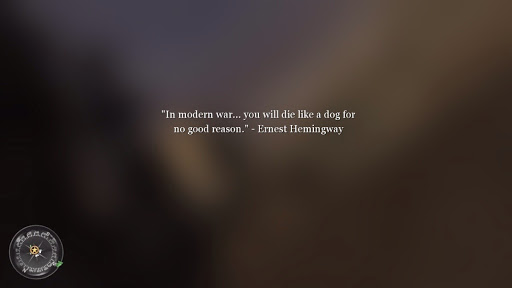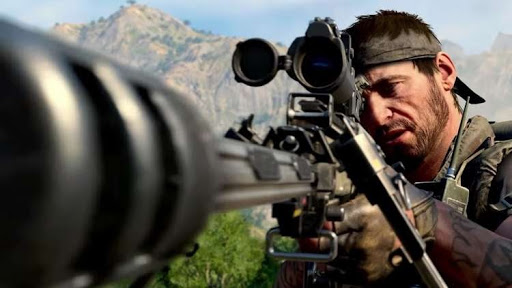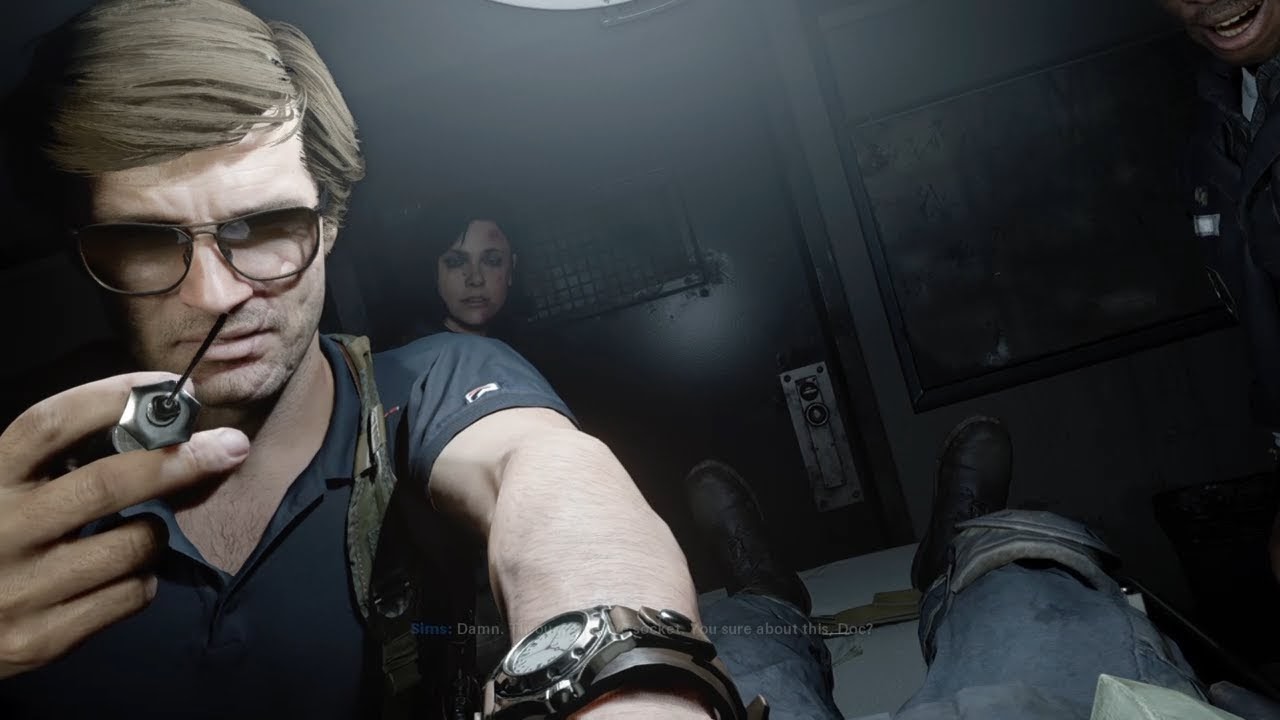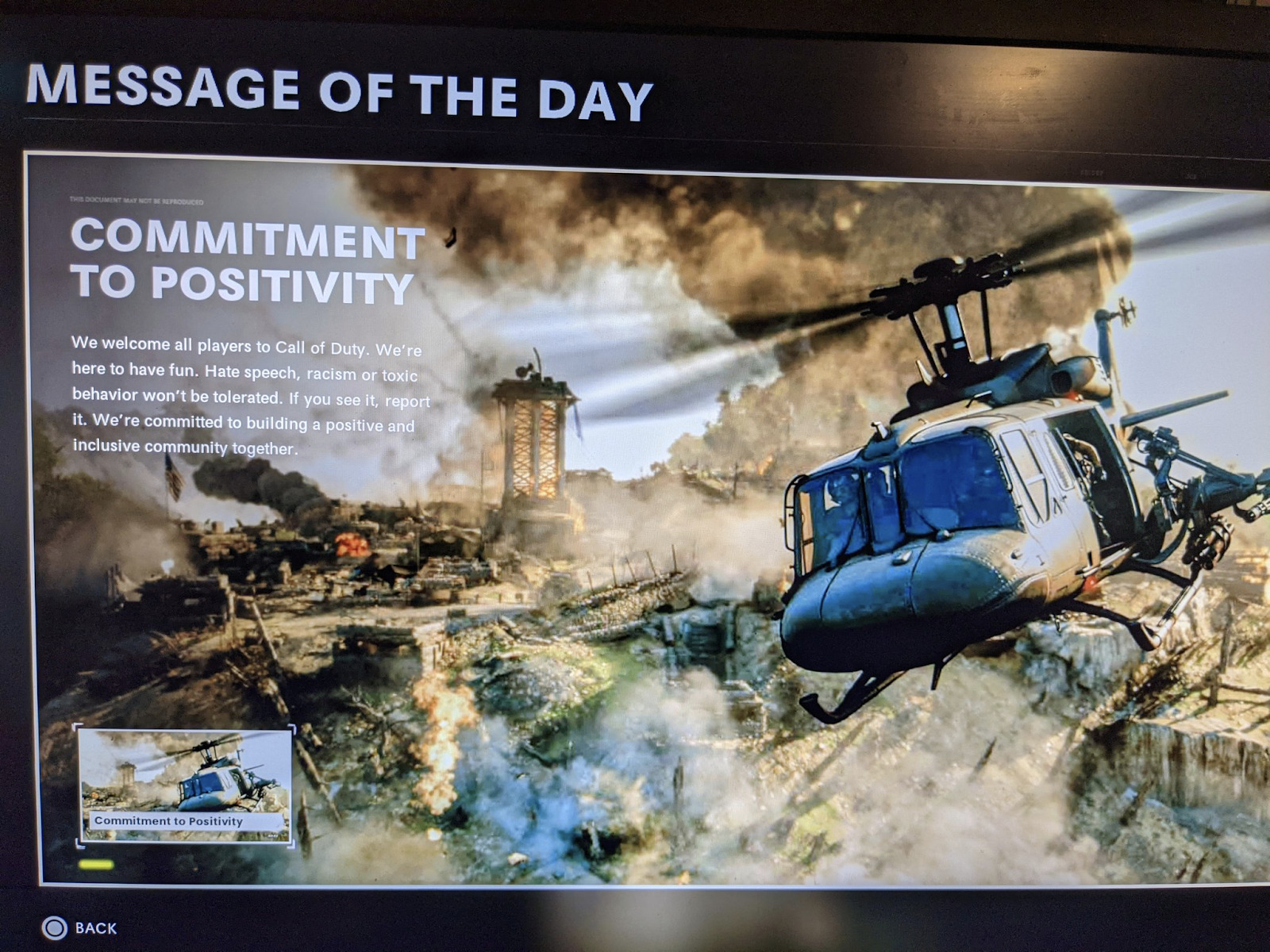Right off the bat, I have to acknowledge the only thing most people know about CALL OF DUTY: BLACK OPS COLD WAR: the grotesque CGI Ronald Reagan who gives you your mission briefing. While he only appears in a couple scenes, his presence is at the core of this game. It’s a type of confused nostalgia and wish-fulfillment; if Reagan is known for one thing in American politics, it’s the way he simplified America’s image of itself. After the failures of Watergate and the Vietnam War left America doubting the validity of the myth of the country as the world’s moral center, Reagan assuaged the country’s conscience by dividing the world up into easily recognizable good guys and bad guys. Of course, America was firmly in the “good guy” column, regardless of what we actually did. And unless you’re a devoted fan of American militarism (which at this point seems to function as a fandom similar to DC/Marvel), the things you do in this game will strain your belief in that inherent goodness.
And that’s what makes BLACK OPS COLD WAR’s story so bizarre. In the same scene in which your squad brags “every mission we do is illegal,” Reagan enters the room to say “who do you think approved their last mission?” Of course, Reagan’s real administration was involved in these sorts of covert operations, most famously Iran Contra. But you’d think a game that seems to be using Reagan’s image to promote the efforts of the US military wouldn’t want to draw attention to such morally dubious activities. Instead, it goes as far the other way as possible, with your squad and Reagan himself taking part in a series of unquestionably vile actions, the worst of which, called Project Greenlight, is at the center of the game’s plot. In the world of the game, Project Greenlight is a project that Reagan approved of in which the CIA placed nuclear weapons under every major Western European city to be detonated in the event that they ever turned communist.
The plot of CALL OF DUTY: BLACK OPS COLD WAR is to stop Perseus (a somewhat real historical figure, the codename was given to the Soviet spy in the Manhattan Project who leaked nuclear weapon information to the USSR) from detonating all of the nuclear weapons that the US government itself set throughout Europe. This does not itself contradict Reagan’s simplified “good guy/bad guy” worldview because the real Reagan would always make exceptions for those who were on his side. In 1973 he referred to the Watergate burglars as “well-meaning individuals committed to the reelection of the president” and “not criminals at heart.” (from ”The Invisible Bridge” by Rich Perlstein). Similarly, it doesn’t seem to have hurt the game’s standing among those looking for something that “readily affirms a pro-American worldview” as it is described in Isaac Schorr’s glowing write-up of the game for The National Review.

English class is in fact, not the place people get introduced to Hemingway
I think the answer to this seeming contradiction is that the game is, first and foremost, a product intended for the widest audience possible, and any attempt to find a coherent ideology in it is futile. Call of Duty was always a series trying to court a non-controversial apolitical stance, despite its subject matter. In earlier games in the series, the game over screens would share supposedly thoughtful quotes about the horror of war from figures like JFK, MLK, or Winston Churchill. Their presence, combined with the first few installments taking place in the most non-controversial war in public consciousness, WWII, kept up that safe image. The MODERN WARFARE subsidies would make the stories bleak enough to convey a “war is hell” message and would feature Russians as the primary villains to avoid backlash for overt racism. This game leans into psychotic jingoism so hard that it, at times, can feel like it’s meant to be a critique (not that Schorr’s National Review piece seemed to mind). At several points it seems as if the game is parodying Cold War paranoia– you break into a Soviet base to find they have a simulated American town inside to practice a RED DAWN-style invasion.
A key point of the game’s plot involves your character being a former KGB agent who receives conditioning via MK Ultra, which in this world was extremely effective and was not just a way to cause their own agents to throw themselves from windows. It’s through this conditioning that you are given false memories of Vietnam to make you inclined to feel kinship to Adler, your commanding officer. They really play it both ways with these Vietnam sequences: you’re meant to take pleasure in annihilating Vietnamese peasants with helicopters and napalm, but the game reassures those who may be uncomfortable because you were never really in Vietnam.

The ever present moral dilemma of “taking the shot”
A more paranoid person may consider the inclusion of all of these details as a way to provide plausible deniability for a piece of right wing propaganda, but I believe the truth is far more boring than that. The Call of Duty franchise is a commodity that has been produced for nearly two decades with no sign of stopping. Profit always comes first. When I booted it up, I was expecting what was described in the aforementioned National Review piece, or Alex Kubas-Meyer’s Daily Beast article which calls it “a Reagan-Worshipping Right-Wing Fever Dream.”
While the second opinion isn’t completely off base, the game I ended up playing was far duller than that, a tired and formulaic FPS hastily made to churn out a new product every year. Even the supposedly controversial elements are done in such a tired way that it’s hard to even be mad about them. Greig de Peuter and Nick Dyer Witherford’s book, “Games of Empire” provides a look into the realities of AAA game development. “[An AAA developer] noted an ‘early chore for the pre- production team’ is quite explicitly to ‘remove innovation’ so that later stages proceed in a highly productive, parallelized fashion….In this environment, ‘the largest sin is not delivering a title on time.’ Conversely, the ‘key virtue’ to management is predictability and ‘control of process.’”

Pseudo-Robert Redford injecting you is a feature AND a fetish
And that’s all I see from BLACK OPS COLD WAR, a process that’s been running practically on autopilot for at least a decade now. They don’t even have the heart to truly be shocking. In fact the most interesting parts of the game are when it feels clear that the developers would rather be making literally anything else, such as a mission where you go undercover in a Soviet base and the game becomes a clumsy ripoff of the Hitman series. There’s even a sequence toward the end where you attempt to break free from your character’s MK Ultra programming that rips off several much more interesting games in the span of a few minutes. In this sequence you find out that Adler’s catchphrase “we have a job to do” was actually a trigger word a la Bioshock’s “would you kindly.”
(A brief aside about The National Review piece: Schorr really resonated with the trigger phrase even after the game tells you it’s meant to manipulate a brainwashed person. “Sure, what Adler did to Bell was monstrous. But as Adler so often reminds you throughout the campaign, he has a job to do (this doubles as Bell’s trigger phrase—one that keeps him in line. So long as you understand that it is a Reaganesque belief in America’s righteousness, personified by Adler— not Bell—who serves as the game’s protagonist, you’ll find the campaign immensely satisfying.” Make of that what you will.)
The game then emulates THE STANLEY PARABLE as you head through Vietnamese jungle paths in this false memory. Adler tells you to go one direction and pick up a particular weapon, but you are free to disobey and frustrate him. Eventually though, the game will force you to stand where it wants you to and hold the weapon they insist upon. It’s an interesting level that feels out of place in such a by-the-numbers game. In another instance, you’re led down into a short horror sequence (in a bunker reminiscent of the game PT) where you go down the same hallway multiple times, with small changes happening in your periphery. But after the experimentation, you’re forced to remember you’re in a Call of Duty game, leading to an ending sequence that’s a good summary of the entire game’s design.
You end up back on the operating table with Adler standing over you and you call him deranged for implanting you with false memories of serving in Vietnam. In one of the game’s funniest moments of pandering, he responds “You’ve had ‘em for a few weeks, that’s nothing, I’ve had ‘em for a decade.” Next, you get to make a choice for the game’s finale. In one ending, you can side with Adler and stop Perseus from setting off the nukes, or you can side with Perseus and kill your own team. Yet another example of the game’s obsession with appealing to the biggest market possible, and allowing them to read it both ways.

Seriously though, is Robert Redford’s team aware of this game?
I played both endings and for me it’s a very easy choice. One ending appeals to the American Empire “fandom,” while another is an almost satisfying story with personal stakes for the character. In the “good” ending you stop the nukes with your squad. Reagan comes back to say “thank god” and is corrected, “No, thank the CIA.” Then after it’s over, Adler kills you because you know too much; this is the fate of patriots. In the “bad” ending, you kill your entire squad, including Adler. I think this is meant to be a more difficult choice because the game seems to insist you have some affection for your teammates Mason and Woods, which baffles me. Mason is a former protagonist so he has no personality in order to better allow us to project ourselves onto him for the handful of missions in which he’s playable, and Woods is just a generic bearded tough guy. After getting your revenge on Adler (the only emotionally satisfying moment in the whole game) the nukes go off and Reagan rightly takes the blame. Both he and Vice President Bush go into hiding and the rest of the world turns on America. The endings could appeal to each reading of the game, full-on military worship or the clumsy attempt at a thoughtful critique.
Of course this “both sides” approach is not a purely successful strategy. In the game’s reveal this past August, the developer Treyarch managed to piss some fans off right out of the gate by showing that players could select from three genders: male, female, or classified. Creative director Dan Vondrak did an interview after the reveal where he said ”If we don’t have something somebody wants, then let’s let them leave it classified so they can be that mysterious, shadowy Black Ops character they want to be.” This attempt to have it both ways was not the portrayal nonbinary players wanted to see, and Treyarch received some harsh feedback. In the final game, the option is listed as non-binary, but its inclusion feels bizarre alongside everything else. I selected the non-binary option for my playthrough (mostly because I wanted to hear how the other characters handled it) and it is jarring to see a squad of war criminals properly gender my character while briefing me in my role in an extrajudicial assassination.

Uh, sure
Everything I’ve mentioned so far is about the game’s story campaign and I almost feel like I’m misrepresenting the game by talking about it at all because it feels like such an afterthought. After installing it, the story wasn’t even downloaded, I needed to grab it from the Playstation Store as free DLC. The way most players will be spending their time with this game is what is there when you download—the three multiplayer modes. Classic Call of Duty multiplayer is the same as it ever was, with some bizarre ideological touches like an occasional message after a kill of “military-aged male down,” and one map depicting a Cuban invasion of Miami. But this is of course counterbalanced by messages from the developers about how “hate speech, racism, and toxic behavior won’t be tolerated.” Multiplayer was by far the most fun I had playing the game, but as is descriptive of the whole package, it’s nearly identical to the product they’ve been putting out every year for over a decade. The Zombies mode is also back and is, for better or worse, the same as you’d remember. Warzone is also here, Call of Duty’s free to play Battle Royale, their real moneymaker. Its inclusion makes the rest of the game feel like even more of an afterthought. The industry has already moved on from the rushed yearly AAA release to this freemium model. They can make far more money from microtransactions than they ever did with one $60 product every year that’s been streamlined and designed to be as inoffensive as possible (or if offensive, at least in a marketable way). It makes seeing studios release new campaigns annually as almost relics of a soon to be bygone era. An awful era that I’ll look back on through rose-tinted glasses the same way many look back at the faux simplicity of the Cold War.
















Comments